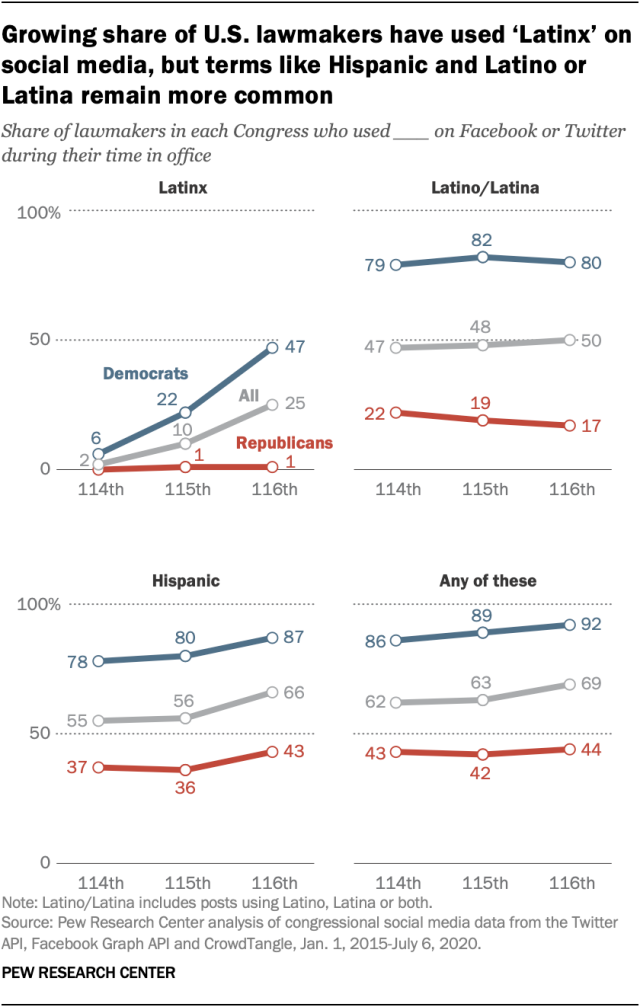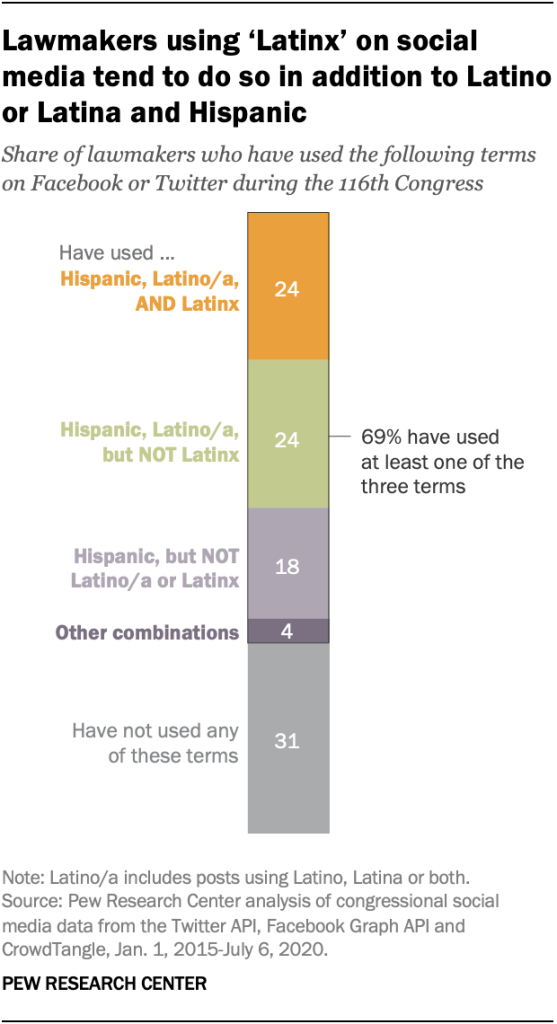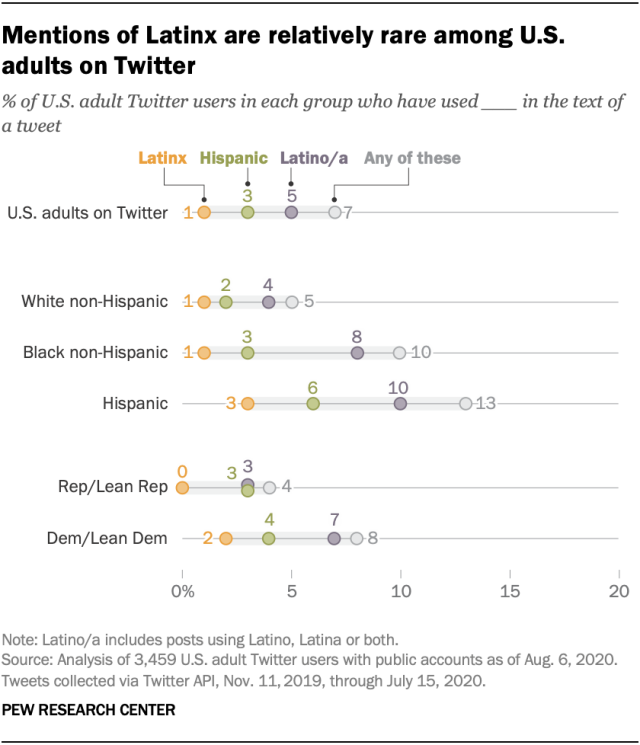Use of the term Latinx by members of the U.S. Congress on social media has increased substantially in recent years, according to a new Pew Research Center analysis. One-quarter of lawmakers mentioned the term on Facebook or Twitter during the 116th Congress, up from just 2% who did so during the 114th Congress. By contrast, a recent survey of U.S. Hispanics by the Center found that 23% had heard of the term Latinx but just 3% use it to describe themselves.
Latinx is a gender-neutral or nonbinary term used to describe people who are of or relate to Latin American origin or descent. It has emerged as a pan-ethnic alternative to Latino, Latina and Hispanic in recent years.
For this analysis, tweets and Facebook posts were classified as mentioning “Latinx,” “Latino,” “Latina” or “Hispanic” if they used those specific words – regardless of capitalization – in the text of the post. (Images and other attachments were not included.) Posts using Latino, Latina or both were combined for analysis as “Latino/Latina.”
As social media has risen in importance in politics and other aspects of society, Pew Research Center has been studying the way members of Congress use platforms like Facebook and Twitter and how they respond to current events and trends. To conduct this analysis of the use of Latinx among U.S. lawmakers, Pew Research Center collected every Facebook post and tweet created between Jan. 1, 2015, and July 6, 2020, by every voting member of Congress. The analysis includes official, campaign and personal accounts. The analysis of U.S. adults on Twitter is based on two panels of survey respondents who agreed to share their Twitter handles with researchers at the Center. The full methodology can be found here.
Although a growing share of lawmakers are using Latinx on social media, that rise has not been accompanied by a decline in the use of terms like Latino/Latina or Hispanic. The share of lawmakers using Hispanic on social media has increased by 11 percentage points since the 114th Congress, while the share mentioning Latino or Latina has increased by 3 points.
Lawmakers who use the term Latinx almost universally do so in addition to other terms such as Latino/Latina or Hispanic. Roughly one-quarter (24%) of members of the 116th Congress have used all three terms on social media, but fewer than 1% have used Latinx exclusively. Put differently, the vast majority of members who have used Latinx have also used Latino/Latina (95%) or Hispanic (98%). But much smaller shares of members who have used Hispanic or Latino/Latina have also used Latinx (37% and 48%, respectively).
The term Latinx is much more common among Democratic lawmakers than among Republicans. In the 116th Congress, nearly half of Democratic lawmakers (47%) have used Latinx on social media, compared with just 1% of Republicans. The 136 members who have used Latinx come from 30 different states, and among House members represent 41% of the total Hispanic population in the United States.
Beyond Latinx, other terms used to reference Hispanic Americans are also much more common among Democrats than Republicans. Notably, eight-in-ten Democratic lawmakers have used the terms Latino or Latina on social media during the 116th Congress, compared with just 17% of Republicans. All told, roughly twice as many Democratic lawmakers (92%) as Republican lawmakers (44%) have used any of these terms – Latinx, Latino/Latina or Hispanic – on social media during the current Congress.
Across both parties during the 116th Congress, larger shares of Hispanic members have used the term Latinx on social media. Fully 69% of Latino Democrats have done so, as have 13% of Latino Republican lawmakers (the comparable figures for all Democratic and Republican members are 47% and 1%, respectively). And in contrast to their party overall, a sizable majority of Republican Hispanic members have used terms such as Hispanic (88%) or Latino/Latina (75%) on social media. Women in Congress are also more likely than men to use these terms, although these differences are less pronounced than differences based on party or Hispanic identity.
Just 1% of U.S. adults on Twitter mentioned the term Latinx between November 2019 and July 2020
Despite the growing popularity of these terms among lawmakers, an analysis of tweets from U.S. adults from Nov. 11, 2019, through July 15, 2020, finds that relatively few ordinary users have employed these terms. Just 1% of U.S. adult Twitter users mentioned the term Latinx on Twitter during this time period, although larger shares mentioned terms such as Hispanic (3%) and Latino/Latina (5%). Overall, some 22% of U.S. adults – and 25% of Hispanics – use the platform.
Even among adult U.S. Hispanics on Twitter, a relatively small share (3%) mentioned the term Latinx in a tweet over the course of these eight months. But Hispanic users are three times as likely as white U.S. adults on Twitter to use one or more of Latinx, Hispanic or Latino/Latina: 13% have done so, compared with 5% of whites.
Note: Here is the methodology for this report.






